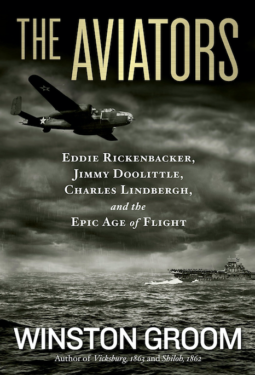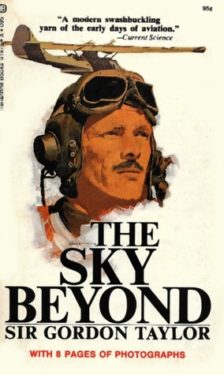 USA Today bestselling author Ward Larsen’s globe-trotting assassin, David Slaton, returns for another breathless adventure in Assassin’s Edge! Check out what Ward has to say about five books he greatly enjoyed which give a better understanding of those who made exceptional contributions to air and space travel!
USA Today bestselling author Ward Larsen’s globe-trotting assassin, David Slaton, returns for another breathless adventure in Assassin’s Edge! Check out what Ward has to say about five books he greatly enjoyed which give a better understanding of those who made exceptional contributions to air and space travel!
By Ward Larsen:
The Pioneers of Air and Space: A Five Book Primer
It’s barely over a century since Orville and Wilbur launched the flight that changed the world. From that moment—twelve seconds of canvas, wood, and bailing wire gliding above the dunes of Kitty Hawk—we’ve progressed to million-pound airliners that connect continents. Over four billion people fly each year, the moon has been conquered, and much of that progress is thanks to a handful of individuals. These five books will give a better understanding of those who made outsized contributions to air and space travel.
 The Aviators by Winston Groom
The Aviators by Winston Groom
The Aviators details the roles of three legendary pilots: Eddie Rickenbacker, Jimmy Doolittle, and Charles Lindbergh. No names are more chiseled into aviation lore, and not surprisingly, the three had a great deal in common. All were awarded the Medal of Honor, and each nearly lost his life in World War II.
Rickenbacker is largely remembered as the Ace of Aces in World War I, a swashbuckling image that belied the gruesome truth of the day—those early wood-and-cloth crates crashed to earth at an astonishing rate. Like many of that first generation of pilots, Rickenbacker was recruited from the ranks of another daring vocation—he was a highly successful race car driver. When the Second World War arrived, he served as a valuable advisor to the Army Air Corps. It was in that capacity, flying as a passenger, that he was nearly killed in a crash in the Pacific.
Doolittle’s claim to legend arrived late in his career, when he led a squadron of Army Air Corps B-25s off the carrier USS Hornet to undertake the first aerial bombardment of Japan. Stirring as that mission was, his more vital contribution to aviation came over a decade earlier when he pioneered the concept of using cockpit gauges to fly blind through weather.
Lindbergh was inarguably the most famous of them all, the man who captured the world’s imagination by conquering the Atlantic. His fame was not without toll, however, throwing his personal and political life into upheaval. In the air, however, Lindbergh’s focus never wavered. He flew combat in the South Pacific during World War II, shooting down enemy aircraft and devising innovative fuel-saving techniques, and he later served as an adviser to both the Air Force and Pan Am Airlines.
The Aviators offers a deeper look at three of the most visionary pilots to ever take flight.
 The Sky Beyond by Sir Gordon Taylor
The Sky Beyond by Sir Gordon Taylor
Gordon Taylor is not a widely known name, but his first-hand account of the genesis of trans-oceanic flying is a must read. Pilots today take for granted GPS that pinpoints their position to with a few meters, and before that reliable radio aids were widely available. In the 1920’s, however, no such electronic luxuries existed. Indeed, there were precious few methods of navigating across featureless expanses of water, and the idea of spanning an ocean was aspirational at best.
With engaging prose, Taylor recounts his methods of tackling the last remaining earthly frontier. He describes modifying a sextant—the instrument used by sea captains for centuries—to function on a fast-moving, unstable aircraft. With little more than a map, compass, clock, and airspeed indicator, he hopped from one tiny Pacific atoll to the next, hundreds of miles of blue water between.
Gordon Taylor’s efforts were technically groundbreaking, audacious, and The Sky Beyond is storytelling at its best, as well as a deeper reflection on man’s pioneering spirit.
 Amelia Earhart: A Biography by Doris Rich
Amelia Earhart: A Biography by Doris Rich
No list of pioneers in the golden era of flight would be complete without the world’s most renowned aviatrix. This biography covers not only her quest for aviation firsts, but introduces a multifaceted woman: writer, public speaker, businesswoman, self-promoter, and when necessary, a sharp-edged competitor.
Rich details Earhart’s upbringing, and the beginnings of her interest in aviation. After capturing the world’s eye by crossing the Atlantic in Lindberg’s wake, we see a woman who is transformed—enduring rather than embracing fame in order to further her passion to fly. The book’s constant undertone, of course, is the universally known ending. The early years of aviation were fraught with hazard, particularly to those who challenged boundaries, a point driven home when Earhart disappeared with her navigator in the vast South Pacific.
The mystery of what happened on that fateful flight remains unsolved, yet Earhart’s legacy is enduring proof that the horizons for women have no limits.
 The Right Stuff by Tom Wolfe
The Right Stuff by Tom Wolfe
In an account that is both technically accurate and stylistically bold, Wolfe tells two intricately interlaced tales: the groundbreaking induction of the original Mercury Seven astronauts, and a competing cadre of test pilots who cheat death daily in the desert southwest. The former group finds instant fame, even before the first of them flies, while the latter toils away pressing the boundaries of aerodynamics, risking their lives on a daily basis.
Wolfe’s prose is as brash as his characters, and the juxtaposition of celebrity against the Spartan military life of the post-war era—including wives who are tied to their husbands’ careers—makes for a thoroughly entertaining read. As the space program finds its footing, a new breed of aviators known as astronauts will ride rockets toward the stars, while the best test pilots, led by Chuck Yeager himself, find they have been leapfrogged on “the pyramid.”
These were heady times, and Wolfe smartly captures the fraternal spirit and “single-seat” mindset of military aviators.
 Sky Gods, The Fall of Pan Am by Robert Gandt
Sky Gods, The Fall of Pan Am by Robert Gandt
There is no more illuminating chronicle of the U.S. airline industry than the rise and fall of Pan Am, and Gandt’s Sky Gods is the consummate telling. The airline industry today is easily taken for granted: billions of people travel the globe each year, and with an unprecedented record of safety. The first attempts at commercial aviation, however, were anything but a success.
Sky Gods details the exploits of Pan Am founder Juan Trippe, a Yale-educated naval aviator who, after his service, swam into the shark infested seas of banking and government, and came out with a leviathan of an airline. Pan Am was the unquestioned standard bearer of the industry for over fifty years. It was the first to cross the Pacific, the first to fly the Atlantic, and the first to go around the world.
Trippe’s vision and drive pushed the airline forward, but it also sowed the seeds of its ultimate demise. The airline business is among the most cutthroat on earth, and the story of Pan Am will forever stand as unique.
I have enjoyed these books greatly, and I hope you will too.
Ward Larsen has flown as both a military and airline pilot, and is the author of the David Slaton series. His latest book, Assassin’s Edge, is available from Forge Books.
Order your copy of Assassin’s Edge here!













How can I install a ripped and saved APK from cloud storage? All the apps worked, and I used My Apk to upload them to Google Drive before a factory reset. Now says: “Rootless Installer Error: Zip does not contain any Apk files.”